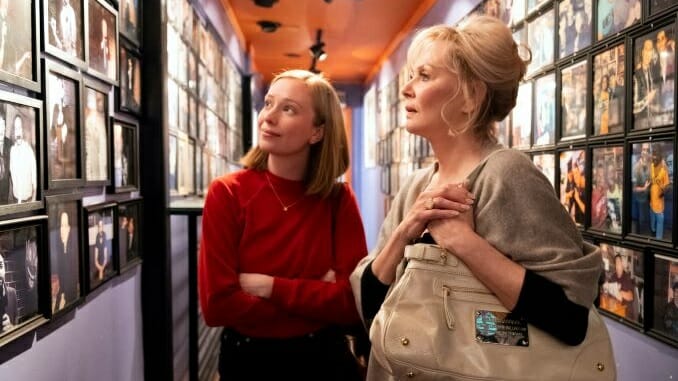Hacks Is a Show about Fame, Not Stand-up
Photo courtesy of HBO Max
HBO Max is steadily making its way up the streamer rankings with runaway successes in original programming like this year’s Hacks, which was just nominated for 15 Emmys. Powered by the incomparable Jean Smart, the show is another look at the highs and lows of stand-up comedy in the vein of I’m Dying Up Here, The Marvelous Mrs. Maisel, and Funny People. The series premiered to widespread acclaim, a reception only really shared with Maisel. But just like Maisel, it largely misrepresents the job.
The series follows the dark mentorship of Smart’s Deborah Vance, a legendary comedian with a longstanding Las Vegas residency, and Hannah Einbinder’s Ava, a young comedy writer hired to help freshen up her material. The premise is promising enough, watching the dynamic between the conflicting ideologies of two whip-smart comedians at opposite ends of their careers under different times… but that’s not really what we have here.
Hacks is essentially The Devil Wears Prada but subbing out Anna Wintour for Joan Rivers. Deborah is our Miranda Priestly, a prickly icon and veteran of the industry, and Ava is our Andy, her new employee that’s way in over her head. The similarities between the two are abundant: the interview that reveals Andy/Ava’s lack of applicable knowledge for the job, her defiant storming out/telling off that ultimately earns her the gig, the acquiring of an impossible to get trinket (Harry Potter manuscript vs. pepper shaker) for the demanding boss, the trusted and overworked gay coworker Miranda/Deborah isn’t above sacrificing if needed (Nigel vs Marcus), and their absolute refusal to cancel their day’s agenda to deal in light of personal trauma (divorce vs. death of ex husband).
In Prada, Andy offers no input on fashion (the filmmakers make it clear that she doesn’t have much to offer) which works because her job doesn’t require it. She’s a personal assistant. But Ava is supposedly here to punch up Deborah’s material, so her viewpoint is essential yet practically nonexistent. We know she doesn’t like Deborah’s brand of humor, but we are never shown what her personal standard of excellence is. We know little to nothing of her sense of humor.
What do we know about Ava the comedian? Well first off, she’s a comedy writer not a stand-up (an important distinction) so this is new territory for her. We know she is a 25 year-old bisexual woman who was plucked off Twitter and given a writing job on a “hit show” whose staff included some actual stand-up comedians. She lost her job after tweeting an offensive joke coupled by a series of replies doubling down on the matter as well as some old resurfaced problematic tweets. She’s unhirable partially because of said tweet but mostly because she’s an entitled asshole. That’s it.
We need more details. What kind of show was this “hit” she wrote on: sitcom, dramedy, sketch, variety? What’s her writing style? Her agent tells us she has no filter and a “strong female point of view,” but those are just buzzwords that could be applied to just about every female comedy writer. Even after she’s hired by Deborah, we never hear any of her jokes save for the aforementioned tweet, a bad rewrite of it, and two more lazy one-liners. As Deborah herself points out, Ava’s material lacks punchlines as evidenced by her quip about the nightmare that is receiving a voicemail. Despite writing pages and pages of jokes, the only joke we see Deborah use is a riff about how a QVC foot spa could make you “break WikiFeet.”
Besides this less-than-a-handful of jokes, it seems she only voices her opinions on comedy in overly vague and short outbursts whenever the plot demands it. Ava talks about comedy like a network executive, which is to say she doesn’t have much of a POV let alone a strong one. She wants Deborah to be more “honest” and “raw” (her sole definition of which seems to be bringing a notebook on stage). She thinks “it’s cheap to joke about people’s appearances” and that traditional joke structure is very “male” and too concerned with the ending, which I can’t decide is sincere or sarcastic. The series itself doesn’t seem to respect her comedic sensibilities. These random glimpses of her ideology don’t feel natural but rather how an older comic like Deborah thinks Gen Z talks. Matcha lattes, almond milk, climate change, monosexist, Planned Parenthood, aack!
This lack of perspective begs the question, what does Ave have to offer us or Deborah? With only one approved joke, she serves as nothing more than a shower thought, someone to aimlessly talk until they inadvertently say the thing that triggers an epiphany, like Dr. Wilson was to Dr. House on House.
It’s not just Ava’s joke writing that’s lacking. We also see very little of Deborah’s actual act and what is there is quite underwhelming. Deborah, of course, is our titular hack. Her humor is meant to be cheap and a product of another time, but it doesn’t seem to serve the plot for this new writer to not be significantly better or more modern as the show is primarily invested in showing Deborah once again take control of her career and elevate it to a new level. She’s finally going to stop playing defense and start playing offense. It’s about raising her standards, but to what?
-

-

-

-

-

-

-

-

-

-

-

-

-

-

-

-

-

-

-

-

-

-

-

-

-

-

-

-

-

-

-

-

-

-

-

-

-

-

-

-








































